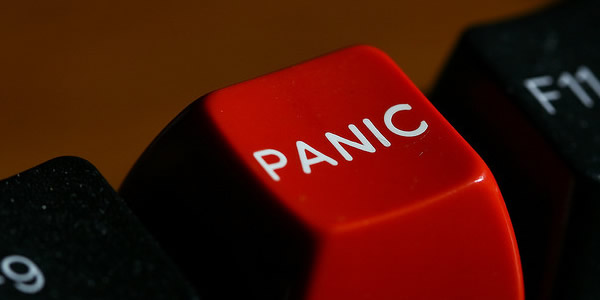Panic and Resilience: It Won’t Help to Hide Under the Bed

By Gail Wagnild
Reading time: 4 minutes
Who hasn’t had a few panicky responses to the coronavirus? The news media continue to fan the flames of fear by using words like stricken, doomed, imperiled, and plunging stock markets. Masks are in short supply even though wearing a mask is ineffective. The risk of acquiring coronavirus in the U.S. is low and expert advice is to wash your hands, don’t touch your face, cover a cough or sneeze and stay home if sick. Among those who contract coronavirus, 98-99% will fully recover. But still there is panic.
I understand fear. Just three days ago I had a prowler come to my home at night. He came up on my dark porch, looked through windows, rang the doorbell and waited. It was late but I had not yet armed my alarm system. I did nothing. I was frozen in indecision. I was unprepared. My exterior camera picked up his image and he was threatening. I didn’t have a plan for this.
Several years ago I read that in a crisis people fall into three groups: 10% are prepared and know what to do; 80% are indecisive and wait for more information or for someone to tell them what to do; 10% are frantic and often do the wrong thing. I fell into the 80% group only because I was not yet running in circles. Instead I waited quietly. Would the intruder break down the door? Did he have a firearm? Why had he targeted my house? I was not prepared and didn’t know what to do.
At the beginning of a flight, the airline attendants always run through the procedures in the event of an unlikely emergency. Most of you no doubt have memorized the precautions. But they are doing three things: Calming you and preventing panic, preparing you for action, and planning for the best outcome. This is exactly what the news media should be doing regarding the coronavirus. But they aren’t.
An essential feature of resilience is self-reliance, which is to be able to depend on yourself to figure things out and to do so calmly and deliberately. This is not self-sufficiency or rugged independence though there are times you will be on your own. It means knowing how to solve problems, make good decisions, and then going forward calmly and confidently. We can’t control the spread of coronavirus in the world but we can listen to and consider credible sources rather than the news media looking for viewer ratings. We can make a rational and effective plan that includes washing our hands. We can depend on ourselves to make good decisions. We don’t have to panic.
In the case of the intruder at my home, while it was good that I didn’t panic, still I had no plan and it could have ended badly as I learned the next day that the man on my porch matched the description of a wanted felon from another state. We don’t want to think that we could be the victim of a violent crime and there may be a tendency to hide under the bed and hope it goes away. But that’s not a good plan. This is what I learned:
- Know how to calm yourself and shut off the alarm switch in your brain and instead focus on solving the problem.
- Be prepared as much as is possible just as the airlines try to help every passenger to be ready in an emergency. Run through possible scenarios and plan what you would do. In my case, had the intruder kicked through my front door, I would not have known what to do. Not only have a plan in place but practice it mentally and physically.
- Learn and master the skills you need to face your fear so that you are ready should the unlikely occur. Gain confidence in your new skills and this will lead to courage in the face of the unthinkable.
We face alone many of the crises in our lives and have to look to ourselves to figure them out. There isn’t always someone else to help us and in the case of the coronavirus, we have to learn to get our information from reliable sources in order to make a good plan for ourselves. My dad was an airplane pilot and when I was young I feared what would happen if he had a heart attack. Answer? Learn to fly the plane. If an unlucky intruder comes through my door, I am now ready.
Self-reliance leads to confidence and courage to do what needs to be done in every situation. When we successfully figure things out our optimism grows for having the capability to deal with future crises and adversities. Being self-reliant builds up our capacity for resilience so that we can be ready for whatever life brings.



